S.D. Reeves's Blog, page 7
July 22, 2020
Newsletters: From the Writer’s Drawer
This is a part two of a TBD point posting about Marketing. As with the other posts in the writer’s drawer series, this is not going to be about how to do something right. Not directly at least. This is more of a post on what I did, have done, or am doing – and hopefully some of the information (my mistakes) here may be helpful. Now today we are talking about Newsletters, and not a historical context.
Email …. Marketing? Is this the 90’s? Believe it or not, even with the advent of social media, newsletters still dominate. They are the descendants of the mail order, and until that dystopian cyberpunk novel becomes a reality and ads are beamed to our brains, they will likely remain so. They are several reasons why, especially as an author, this is the case:
Engagement is important, and few things allow you to directly stir things up (legally, stalking is a no-no) like email. Facebook, Twitter, put your subscribers behind paywalls. Email/newsletters circumvents that. For the most part readers must interact to inevitably not have to interact.
Ominous sounding eh? In reality it is quite benign, but auspicious; as the curator you maintain your image, brand, and message.
Early in my career I focused on everything but a newsletter. In fact, I didn’t have one. Partly because I thought the age of email marketing was over, and partly because I had no idea what to write. By the time I began working things out my book had already been out for half a year. The first issue when I came around, was finding subscribers. I was my first, and my wife the second. It stayed like that for a while, until I found some paid services:
AuthorsXP
Booksweeps
Bookthrone
Some, like these give authors a way – after paying a fee – to join premade group giveaway contests. Generally, they offer up a collection of free books to a winner, and people can sign up for a chance to win them. Others:
Bookfunnel
Kingsumo
Give you a platform to create your own giveaways. Now, I am not going to get into the benefits and negatives of any of these services. But what I will do is briefly highlight one free, author made resource which has been extremely helpful in connecting me with likeminded readers. And that would be Storyorigin. Generally speaking, it gives the most benefits to people who already have a bit of a list, but it is free, and allows you to sign up with other authors for mutual promotion. More often, since the people who subscribe are already fans of other, similar authors, there is already an interest there beyond just a freebie. I have had a plethora of wonderful conversations with folks who have signed up via that site.
But conversations only happen if you have content.
This is perhaps the portion most writers find challenging, and one where nobody can really give you any advice. What makes great content? Whatever your audience likes. What does your audience like? Different things, every time – because like all friends, people come, and people go. There is no point in dreading it. Especially if you are from Alabama and insist on reading southern folk stories to your fantasy readers…Not saying anyone I know did that.
On the technical side of things professional marketers like Nick Stevenson will give you some great ideas, especially with automation and your first couple of emails. His thought about leading with a welcome email, with a free story, is a good one. As are his beliefs that the follow ups mails should then delve into you and your writing. Everything else, as we have mentioned, is very subjective. I would avoid investing in any service that offers special insights on newsletter creation, or otherwise. Most of that information, while useful, can be found in a few hours of using doctor google.
However, I will leave you with one bit of advice. The most important thing I have come to find is that people who subscribe to your newsletter want to know about you, and your writing. Start there. After all, it is rather the point of the whole proposal eh?
Next major post will focus more on the review side of marketing, their importance, and some options I have investigated there. Though I believe I will make a light hearted addendum to this post, with some of the stupid nonsense I’ve said over the years in my newsletters.
Till then, keep writing, and don’t sweat the small stuff! Course, the small stuff can kill you. Let’s try to keep it positive, though.
July 8, 2020
Rev Req: Dead Sky Order, by Timothy Murphy
A book, like most things, is the sum of its parts. Good stories can make mediocre novels, just as a great joke can be bogged down by the performance. It is all in the details – the timing, execution, etc. And there are many degrees of separation between ratings; the more missed queues, the worse the overall experience is. Even if the core of the creation is a solid piece of work. The Dead Sky Order is a good example of this; a great story cut to death by many niggling issues.

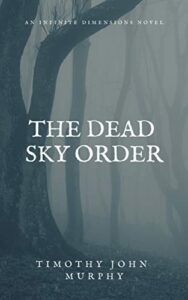 In this dystopian book the barbarians are literally at the gates as infected hordes are crossing the river, threatening one of the last bastions of civilization. To make matters worse ancient and powerful beings called Ka-Guardians have resurfaced, manipulating the events for some unknown purpose.
In this dystopian book the barbarians are literally at the gates as infected hordes are crossing the river, threatening one of the last bastions of civilization. To make matters worse ancient and powerful beings called Ka-Guardians have resurfaced, manipulating the events for some unknown purpose.
But all is not as they seem, and somehow a young girl name Samar may be the key to figuring out what is happening.
Timothy John Murphy’s tale weaves the narrative of several characters as they try to survive and understand the changes happening to their plague riddled world. I found his prose at times inspiring, and intense. His characters are dynamic and believable, and the pace of the conflict is sufficient to keep you interested.
For the most part. However, if you read the opening paragraph of this review, there has to be a “but.” Remember where I mentioned “unknown purpose,” in relation to the Ka-Guardians? Lack of backstory creates a dearth of clarity. While I was intrigued to enough to keep reading, it seems like many of the events that unfold happen without any proper buildup. There was no weight, to both ground the story, and build intrigue into why something was happening. In the end I felt like I was being swept along a river with little to grasp on.
And then there was the uneven prose. While there were some wonderfully descriptive examples, there were equally as many strangely constructed sentences and lines of questionable grammar that I was often jolted out of immersion. This inconsistent writing also crossed over into the dialogue and helped to lessen the emotional impact of various scenes. In the end it was too much. No amount of strong narrative/story-line can extract a flawed execution totally from the muck.
Overall, I enjoyed the book, but I had a feeling that I could have enjoyed it much more if there was a bit more polish. Dead Sky Order, simply put, never really rose above. While the sky may be the limit, you need a lot of oomph to get off the ground.
June 20, 2020
Rev Req: Firewing, by Jennifer Povey
Firewing by Jennifer Povey crawls, and scurries. It scrapes, and it plods. But unfortunately, despite some effective world building, the novel – unlike its protagonist – does not fly.

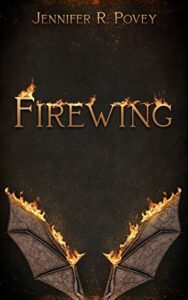
Cathren is a half-demon living on the world of Yirath, a world inhabited by two species (humans and demons). She is the subject of some tit-for-tat prattling going on between deities, as Cat was magically created to be a vessel for an evil god. This will be important, because the latter half of the story focuses on a quest to avoid an apocalypse centering around this fact. All of this happens after the murder of her teacher/jailer, and she is friend zoned by a love interest. In short, she has had better days.
Reading through my notes I was struck by one major thing – how unimpactful most of the events, characters, and themes were. Scenes progress and characters react without any emotional impact or real development. Motivations are unclear, or bi-polar; Cat for instance, moves from wanting to kill her mentor herself, to mourning the loss of someone she admittedly never cared for, or vice-versa. Moreover, the secondary characters we see are bland. They come to us as if on a conveyor belt, ready for their cameo, as if this were a popup book. Half the time they seem to only exist to be sized-up for a possible love interest (and the conclusion of this happens almost instantaneously). If this wasn’t enough, the rhythm of the novel is hampered by a serious dose of introspection that serves neither to advance the plot, nor establish the character.
This said, there is a story here, under the clutter. Povey has a mind for world-building, and I think with a proper editor – one who can cut out all the unneeded chaff – this could make for a good, if light, read. For the moment however, I would say this work needs to be tossed back into the fire, and reformed.
June 1, 2020
Review Request: The Norse Queen, by Johanna Wittenberg
Nuanced, professionally researched, and exciting. The Norse Queen by Johanna Wittenberg is a rare triple threat to your free time.
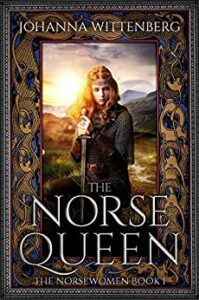
Norse mythic novels were all the rage about fifteen years ago. These ranged in quality, so when I was approached with this title, I was at first a bit skeptical. Until I did some laymen (google) research:
“Åsa Haraldsdottir of Agder was a legendary Norwegian Viking Age queen regnant of the petty kingdom of Agder. According to sagas referencing the clan Yngling…”
Yes, the character in question existed, and after reading just a few chapters in, I was astounded at the quality. We follow Asa, the future and titular Norse Queen, in a coming-of-age adventure to recover her birthright and avenge the events that lead her to be the last remaining member of her family. Drama ensues, and we are treated to a winding mystical, sometimes even fantastical, story.
Wittenberg has navigated a difficult road in this retelling, spinning compelling drama while keeping true to the larger details. This is a historical drama. This is at times, a fantasy piece. This is a love story with plenty of action and enough rituals and historical references to make a history nerd not troll it into oblivion. Beyond this I found the author’s writing style fantastic. Touching upon my original fears, I was worried this book would end up being a bit oversimple; if I were to do a cliche faux pas and judge it by the cover. That is not the case. The descriptions are wonderful, and really help ground the plot. In addition, the characters are all well-written. Even the main antagonist is sympathetic – full of the moral grey that an unforgiving world requires.
Ahh, but nothing is ever perfect. Insanabile cacoethes scribendi. Latin, an incurable vice of writing, but it applies here (taken literally). Norse Queen follows a rhythm like most others, the old symphonic structure. The middle by this is usually the place that is softer, sweeter; it drags. This book is no exception. Also, I was not entirely convinced that two characters (the romantic aspect aforementioned) would form a believable pair. Still, given the conclusion, this is not enough to really knock the book.
The Norse Queen is a well-written and exciting tale. Wittenberg’s writing is nuanced, descriptive, and vivid. Her plotting, and storytelling is also superb. I was happy to have been given the opportunity to read this wonderful tale, and I fully believe this book has all the key ingredients of any good historical fiction and will delight fans for years to come.
Purchase Links:
| Amazon UK |Amazon US |
May 25, 2020
Interview with Manybooks
I don’t know if it comes from living in Switzerland these last eight years, or just me getting older, but my Interviews are becoming cheeky. The folks at Manybooks were great though, go check out my feature!
May 11, 2020
Review Req: The Murderer’s Apprentice by Daryl Anderson
This murder mystery takes everything I normally dislike – the 60’s, baseball, annoying kids, polish food – and combines it in way that I found enjoyable. It will drag you into the setting, ground you with believable characters, keep you reading with a plot that blossoms with satisfactory timed reveals. And thoroughly annoy you with baseball trivia and a subplot that does nothing for the narrative. In short, the Murder’s Apprentice by Daryl Anderson is a rich, detailed, albeit flawed story with strong cast of characters and plot line.

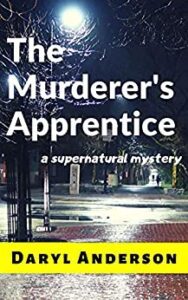 The POV alternates between Dara Burk, a 12-year-old tomboy, and Stan Gorsky a policeman and would be detective. Anderson eases us in with Dara’s side of the story first, which while initially light-hearted, quickly becomes grittier and more real-to-life. Her chapters establish the first inklings of an issue, using a macabre hobby of collecting photographs of deceased people as a narrative device. This becomes important later and helps to link it to the second POV character and the overarching plot. Stan on the other hand fills the procedural detective aspect. He has been dragged into this by an ex-flame, which turns up some family drama which helps to keep his side rooted.
The POV alternates between Dara Burk, a 12-year-old tomboy, and Stan Gorsky a policeman and would be detective. Anderson eases us in with Dara’s side of the story first, which while initially light-hearted, quickly becomes grittier and more real-to-life. Her chapters establish the first inklings of an issue, using a macabre hobby of collecting photographs of deceased people as a narrative device. This becomes important later and helps to link it to the second POV character and the overarching plot. Stan on the other hand fills the procedural detective aspect. He has been dragged into this by an ex-flame, which turns up some family drama which helps to keep his side rooted.
Anderson is a subtle and clever author, able to thread these two contrasting viewpoints deftly together into a murder mystery plot that is both believable, and exciting. There is a lot of detail and research here, and no easy outs. She brings life to the characters and world in way – even alternating her writing style to accommodate – that few others attempt. This is artistry at work.
However, that said, there are a few problems. At times Anderson gets so wound up in the setting that she will run off on a tangent with descriptions and world building. Now, I love that sort of thing, but towards the middle I found myself skimming. This problem manifests in a different manner towards the end of the book with an extraneous subplot (trigger warning, involves sexual assault). This scene neither advances the story, nor affects the character in question in any meaningful way. As such, it begs to question why it was included. Also, an early paranormal element in the first half of the book is dropped quickly with no explanation. It left me wondering if this was an aspect that was later nixed, and just not edited out. But this doesn’t terribly distract from the overall picture enough to upend the book.
At the core, the Murder’s Apprentice survives its flaws, and comes together in a solid, well-written mystery. Anderson’s ability in weaving two storylines is almost masterful, and her understanding of the genre, deep. Taken as a whole this book will presents a wonderful choice for fans of the murder mystery genre.
May 8, 2020
Review Request: The Nature Of Your Personal Environment, by Steve Griffiths
Expanding your horizons is always a worthy goal. Whether that means learning a new trade skill, memorizing a bunch of Star Wars Trivia. Or, possibly, reading a metaphysical self-help book. Normally the latter does not fall on my to-do list, but I found Steve Griffiths’ the Nature of your Personal Environment an interesting read.

 Amid this ongoing pandemic and quarantine, this book could not have arrived at a better time. Like a sort of Tiger King of self-help books, the contents are perfect for the challenges of isolation. In addition, the positivity in the pages is palpable, which is more to be said than any newspaper headline. Griffiths believes that the ego can be harnessed to affect our realities. It is a sort of mind-over-matter distilled into a mind-over-experience concept, a grandiose version of “if you keep positive, good things will happen.” We, he proposes, are the ever-fluctuating construction of our own beliefs and perceptions. With the right training this can be altered, to our benefit, and that appears to be the goal of the book.
Amid this ongoing pandemic and quarantine, this book could not have arrived at a better time. Like a sort of Tiger King of self-help books, the contents are perfect for the challenges of isolation. In addition, the positivity in the pages is palpable, which is more to be said than any newspaper headline. Griffiths believes that the ego can be harnessed to affect our realities. It is a sort of mind-over-matter distilled into a mind-over-experience concept, a grandiose version of “if you keep positive, good things will happen.” We, he proposes, are the ever-fluctuating construction of our own beliefs and perceptions. With the right training this can be altered, to our benefit, and that appears to be the goal of the book.
The concept has its merits. Patterns are everywhere, and easily distinguishable from fate and destiny, which is illuminated here. Griffiths is also an effective communicator on his ideas. As mentioned, he keeps positive throughout, and at times I find this refreshing. Albeit towards the end I was ready to turn the phrase “the loving ego,” into a drinking game. Further on the negative side, there are spots of questionable grammar and sentence construction that while not incorrect, just do not read well. Moreover, the setup of the chapters and the reveals is formulaic and can come across as disingenuous. In other words, this basically follows the stereotypical format of every self-help book you have ever heard of. That is not necessarily a bad thing, it is just a thing. Efficiency can be a double-edged sword.
An interesting read – a rather ambiguous statement, I admit. In this case take it at face value; I am neither a philosopher, scholar, nor a new age flunky. I was also never – at least to my knowledge – dropped on my head as an infant, or someone who had/has a predilection for sniffing glue. Interesting in this context means engaging, and thoughtful enough to maintain my interest. This is the sort of book that would find its way to my coffee table eventually, in the vain hopes of distracting any would be guests while I escape out the back door.
Three and a half stars.
ShareTweetSharePin0 Shares
April 26, 2020
Review Request: Jerimiah Jerricho, Book 1, by Azariah Scott.
Sometimes being a clever writer just is not enough. Case in point, Azariah Scott’s Jerimiah Jericho: Allowance.
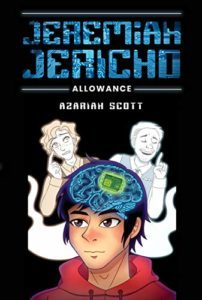

The story is a complex one that swirls around an implant that imparts divergent personalities, the consequences of using there-of, its effects on a typical teenage boy, and the government who wants this particular piece of technology for themselves.
The characterization of Jerimiah is a strong one. If there is one thing Scott is good with, it is sculpting a believable character. The issue is that the book is written in a stream of consciousness style that has little to no grounding. Stronger settings, better descriptions, and otherwise would have gone a long way to providing breathing points to coalesce around. Unfortunately, I found that reading this book felt like I was being swept up in a flash flood, constantly trying to keep my head above water. In the end, I drowned.
Jerimiah Jericho, Allowance, is not an easy read. But, for those who enjoy this sort of writing style, you can do much worse.
ShareTweet
April 18, 2020
Review Request: The City of Locked Doors, by Tristan/Kegan Kozinski
World building is not easy. Character development is tough. Dialogue tricky. Not falling asleep at the wheel (i.e. plotting), problematic. The City of Lock Doors, by the Kozinkis clicks most of the check boxes. However, something is missing.
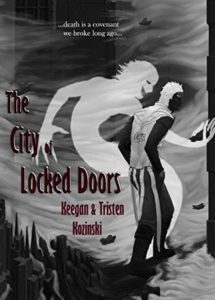

Before chapter one can put its hooks into us, we are given a glossary of terms. Now, I have seen other novels do this to varying degrees of success. On one hand it is helpful to have that information right up front, but on the other it can be a bit of a warning sign: danger, info dumps ahead. Thankfully the Kozinski brothers navigate this effectively enough.
However, since we are talking about warning signs, I would suggest updating that art. Nothing says, “written during math class,” than art that looks like it was drawn during said class. I perused the other titles produced by these two so I know they can do better.
Into the novel itself, we are immediately introduced to the strangeness of the post-apocalyptic world of Umbras, and Noir our anti-hero. There is a lot going on here. Plagues, a sort of lycanthrope condition, various magic users. The setting takes a while to get used to. Then there is the storyline which folds the background into a plot revolving around the revenge for the murder of Noir’s brother. Political subterfuge, and a coming-of-age story are also thrown in, the latter dealing with the second main character, Adrian – who is more akin to this novel’s Sam, than Noir’s Frodo. What makes this even more complicated are some of the stylistic choices, along with Noir’s constant inner thoughts, and a divergent personality thereupon.
This is not an easy read, and a lot of aspects seem to be both equally brilliant and lacking. I am going to break this down into a few sections.
Characters
The main and supporting cast are unique, fully realized individuals. Though Noir is in some ways a Gary Stu sort of anti-hero, he is never boring. We do not get any real character development from him, however. Such instead comes through the other main protagonist, Adrian. She is a more light-hearted, innocent choice, with weaknesses and vulnerabilities. These side characters serve as better vehicles for drama.
Dialogue
One of the main strengths is the excellent dialogue. None of it is stilted, or unrealistic. The little nuances the Kovinskis infuse into their work help establish the uniqueness of the characters and keep the novel entertaining.
Setting
The world and environs are vibrant, and well described. But not realistic. It is hard to picture the city as something that would or could exist. Naturally, this is fantasy, and by some standards it is meant to be unrealistic. However, the systems in this book stretch disbelief.
Story
Here is where we see more issues. The revenge plot is standard, but there is little real tension. Every fight scene either ends with Noir completely outclassing his opponent or lulling them into a false sense of security when he inevitably brings out some trick. Often, the reader is led to believe Noir is in serious straights, only to be revealed at the end that he was never in true danger. Rather like an old school professional wrestling match. Effectively, the entire resolution and all the twists are predictable, and you are left with the feeling of something missing. Rather, like the story is rushed.
Writing Style
The prose in his story is fantastic. Yet there are times when the word choice is probably a bit too sophisticated for the intended audience. Personally, I think that there are enough books catering to a simpler clientele. A lack of clarity, however, is an issue. The first few chapters take a while to get used to, especially as there is nothing explaining who – inside Noir’s own head – is talking at any time. Couple this with the previously mentioned complicated word choice and it is understandable that some readers will have problems
Final Verdict
Despite the problems I found this an entertaining read. I was not absolutely drawn to it, nor repelled. The prose is charming, the characters interesting, but the story line in the end was not meaty enough to push this book over the top. Still, it is a solid three stars, to three-and-a-half sort of book.
March 20, 2020
Review Request: I Escaped Amazon River Pirates, Scot Peters & Ellie Crow
There is a distinctive style to “I Escaped Amazon River Pirates.” I wouldn’t call it a throwback, a better phrase might be “lovingly inspired.” Either way, that wonderful educational, spirit of adventure that dominated media from the 80’s through the 90’s touches this story.
Peters and Crow’s (sounds like a kid’s television show) novel succeeds, even despite the fact there is really nothing new here. And that, to be honest, is the hardest criticism I can really throw. We follow two siblings – well, step-siblings, as they will be want to remind you throughout (in of itself, a trope) – Nick and Maddie. These two have been whisked away to the Amazon by their parents, in what reeks of a midlife crisis. Naturally, everything doesn’t go as planned, as the ferry they are on is boarded by pirates. After Johnny Depp…Wait, wrong type of pirates. After a grungy group of not-as-commercially-friendly-real life bandits cause a split in the intrepid group, right down the age lines (trope two), our young protagonists must fend for themselves. What follows is a thrilling, non-stop ride with some surprisingly good prose, and a knack for inserting educational moments without force.
I had a lot of fun reading this. I had even more fun pretending it was a 90’s cartoon show. Peters and Crow’s book is short, easily digestible, and full of wonderful moments. I am sure kids of all ages will find something to love about it, and thanks to their skilled hand, they might learn a bit as well.



